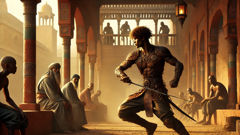Introduction
In the shimmering golden heart of ancient West Africa, where the sun cast long shadows over endless stretches of savanna and the acacia trees whispered secrets to the wind, there once flourished a city whose very name resonated like a song across the land: Wagadu. It was a city of abundance and power, encircled by strong red walls, crowned with proud towers, and bustling with merchants, storytellers, and warriors. The Soninke people, renowned for their wisdom, valor, and artistry, called Wagadu their home—a place where the memory of ancestors lived on in stories recited beneath starlit skies and songs woven by the griots, the keepers of history.
Yet, even the mightiest city cannot resist the turning of fate’s wheel. At the heart of this tale stands Gassire, son of the king, whose name would be carved not in stone, but in the memory of a nation. Born with the fire of ambition and the thirst for glory, Gassire believed his destiny lay with the sword, his path paved with triumphs on the battlefield. But destiny, as the elders say, is a river with many twists, and Gassire’s journey would carry him far from the echo of war drums to the gentle, haunting pluck of a lute.
Here, amid the heat-hazed plains and the fragrance of baobab fruit, begins an epic that is more than the rise and fall of kingdoms. It is the saga of a man’s struggle between pride and wisdom, of a people’s resilience through loss, and of the timeless power of song. Through Gassire’s sacrifice, the city of Wagadu would endure—not in brick and mortar, but in the living breath of memory, sung by generations yet unborn.
The Warrior’s Dream
Gassire, eldest son of King Fassa of Wagadu, strode through the palace with the unshakeable confidence of youth. His every movement echoed with the sound of ambition—his leather sandals striking the mosaic floors, his dark eyes scanning the horizon beyond the city gates. Wagadu was at its zenith, a beacon to traders and kings alike, but within the heart of its prince burned a restless yearning: to carve his name in the annals of legend.

His father, King Fassa, ruled with the wisdom of countless seasons. Under his reign, Wagadu’s granaries overflowed and its forges rang with prosperity. Yet Gassire saw only shadows lengthening behind his father’s throne. He hungered for his own time, his own glory. In the torch-lit halls where elders recited proverbs and warriors swapped tales, Gassire’s impatience grew. He sparred each morning in the palace yard, the clang of iron ringing above the cries of market women and the coos of doves. He led hunts across the savanna, bringing down gazelle and lion, returning with trophies that failed to fill the emptiness inside.
One evening, when the moon rode high and cool breezes slipped through the city’s walls, Gassire sought out a sage whose eyes gleamed like embers beneath his indigo hood. The old man’s skin bore the creases of a hundred harvests, his staff decorated with cowrie shells and ancient glyphs. Gassire demanded, “When shall I wear my father’s crown? When shall Wagadu know my strength?” The sage’s reply was a riddle, spoken in a voice soft as dust: “You shall be king, Gassire—but only after Wagadu has fallen. And when it is gone, your name will outlive its walls.”
Fury seized Gassire. To him, the prophecy was an insult, a whisper of doom from an old man too afraid to face the truth. He dismissed the warning and doubled his training, mustering his followers for displays of martial prowess that filled the palace with tension. His brothers watched in silence, the councilors exchanged uneasy glances, and his mother whispered prayers to the ancestors. But the more Gassire grasped for power, the more it slipped away, as if destiny itself recoiled from his touch.
Restless nights became his companion. In his dreams, Wagadu’s towers crumbled beneath a sky of crows; rivers ran red, and voices called his name from the shadows. But in waking, Gassire set his jaw and swore he would defy both fate and prophecy. Yet, as the days turned and the city’s fortunes wavered, he could not shake the sense that a storm was gathering—a storm that not even his sword could turn aside.
The Lute and the Fall of Wagadu
It began with rumors—whispers of unease at the city’s edges. Caravans returning from distant lands spoke of new threats: fierce raiders from the north, strange omens painted in blood-red sunsets, and a sense that Wagadu’s luck was turning. King Fassa called council upon council, seeking wisdom from his advisers and soothsayers. But Gassire saw only weakness in caution. “Let us ride out,” he urged, “let us show the world that Wagadu is not to be threatened!”

The king, heavy with age and sorrow, listened to his son’s pleas. But the elders reminded him of the prophecy: that Wagadu would not endure by the sword. Gassire was deaf to such warnings. He mustered a company of warriors, men loyal to him by blood and by promise of future glory. They rode forth across the savanna, banners snapping in the wind, the bronze of their spears catching the rising sun. The campaign was fierce—skirmishes rang out beneath the shade of baobab trees and at river crossings choked with reeds. Gassire fought at the front, his blade slick with the sweat and blood of foes. Victory came, but it was hollow; for every enemy defeated, another seemed to rise, and each triumph was shadowed by loss.
Upon their return, the city was not as they had left it. The people wore worry like a shroud. Crops withered under sudden drought, wells ran low, and strange illnesses took root. The voice of the sage grew louder in Gassire’s mind, his prophecy echoing in every misfortune. It was then that Gassire, restless and sleepless, wandered the palace gardens in the starlight and heard a melody unlike any before—a soft, haunting tune that seemed woven from the air itself. Drawn to its source, he found the old sage seated beneath a tamarind tree, cradling a curious instrument: a lute carved from ancient wood, strung with shimmering gold.
“Come,” the sage beckoned. “Take this lute. Your destiny lies not in war, but in song. Only through its music will Wagadu’s spirit endure.” Gassire, still proud but worn by grief and doubt, took up the lute. At first, the instrument yielded nothing but silence and discord. Frustration welled inside him; he struck the strings until his fingers bled, his heart pounding with rage and sorrow. Yet as his blood fell upon the wood, the lute stirred—its song swelling with a depth and sorrow that was not merely music, but memory. In that moment, Gassire understood: the lute’s voice was born from sacrifice.
As Wagadu faltered, beset by famine, conflict, and fear, Gassire walked its streets playing his lute. The music carried tales of heroes and ancestors, of triumphs and defeats, of all that Wagadu had been and could be again. His songs were both a lament and a promise. People gathered in hushed circles to listen, tears glistening in their eyes. The city’s spirit burned bright in their memories, even as its walls began to crumble. Through his song, Gassire realized that to preserve Wagadu, he must let go of power—and become its griot, its memory-bearer.
Conclusion
Wagadu did not vanish in a single night; its end came slowly, like a song fading on the wind. The city’s towers fell, its fields returned to wildness, and its people scattered to the four corners of the earth. Yet wherever Soninke hearts beat, the story of Wagadu lived on—carried not by warriors or kings, but by the song of a man who learned that true greatness lies not in conquest, but in remembrance. Gassire, once a prince eager for battle, became the first of the griots, wandering with his lute and weaving together the past and the future in verses of sorrow and hope.
Through loss, he found wisdom; through music, he preserved his people’s soul. The memory of Wagadu grew stronger with every telling, echoing in marketplaces, by campfires, and in the hush of night when children listened wide-eyed to the voice of history. For as long as the griot’s song endures, Wagadu shall never truly be lost. In this way, Gassire’s sacrifice became the foundation of a tradition—the living archive of a nation’s soul. It is in memory, more lasting than stone or gold, that true immortality is found.













